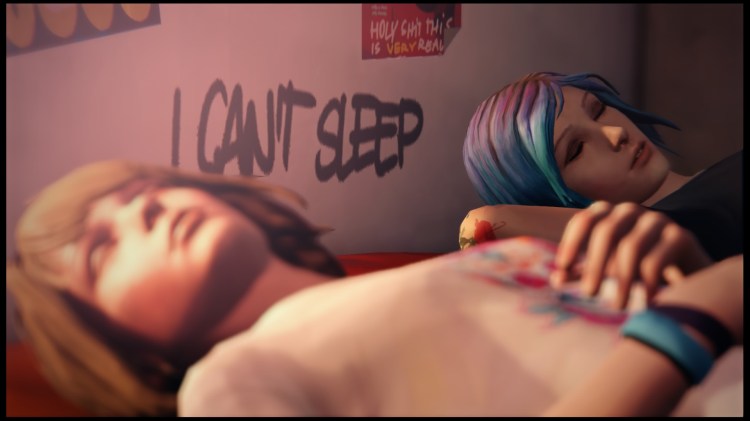Check out our Reviews Vault for past game reviews.
When I finished the second episode of developer Dontnod Entertainment’s episodic game Life Is Strange, I felt horrible.
I’d spent the whole time making tough choices, reconsidered, gone back, and made different decisions until the game took main character Max’s time-resetting power away just in time for the toughest scene yet. It was effective, powerful, and it left me staring at my TV through eyes that patently refused to stay dry and wondering how they could follow it up.
Dontnod’s answer to that question is Episode 3, Chaos Theory, which is out now for PlayStation 4, Xbox One, PlayStation 3, Xbox 360, and PC. It takes all of the second installment’s momentum and emotional impact and leverages it into … stealth. And swimming. And spending a lot of time with arguably the worst best friend imaginable.
It recovers admirably at the end, but it’s a long way getting there.

Above: Prepare to spend a whole lot of time with Chloe “Hellatotes” Price.
What you’ll like
The character relationships are interesting and realistic
Maybe you don’t remember what it was like being 18, but I’ll nutshell it for you: Everyone was horrible. And Life Is Strange captures that grueling period in everyone’s life so accurately that you get high school frustrated all over again. The personalities fit, the motivations make sense, and you like (and hate) people for all of the right reasons.
The high point continues to be Max’s inner monologue, in which she makes the sort of awkward jokes and comments that we all think but hope we don’t say aloud because anyone who heard us would immediately cringe and walk away.
Not that I know anything about that.
The most interesting relationship continues to be between Max and her troubled, delinquent best friend, Chloe, and it’s a highlight specifically because it’s such a terrible friendship. Chloe is never at fault, refuses to take responsibility for her mistakes, and lashes out whenever anyone tries to call her on her selfishness and one-sidedness. It’s hard to understand why Max keeps hanging out with her — unless you’ve had a friend like that, and then you get it completely.
Chloe’s failings as a friend and human reflect the constant tension Max feels over how responsible she is for the young women, and it’s provided her with motivation and direction throughout the series. It’s as fascinating and accurate as it is confusing and frustrating, just like real people, and Dontnod’s doing a fantastic job of balancing everything.

Above: High school is like floating in a sea of terrible.
The time-rewind puzzles are as good as ever (when they happen)
Life Is Strange is at its best when you’re using Max’s Prince of Persia-style time-rewinding powers to solve puzzles and make differences in people’s lives. And when Chaos Theory finally gets around to letting you do that sort of thing, it’s great. This episode includes a couple clever uses of the talent to help Max get into locked rooms and get information from multiple sources in the same room.
She ultimately has an opportunity to make a major change using her temporal chicanery, and it’s one of the high points of the series so far. You understand how important it is for her to succeed, and you share Max’s frustration and fear that she won’t be able to pull it off. It’s a smart and emotionally driven scene, and it’s clearly what the developers had in mind when they came up with this story.

Above: It’s time to sneak. Like a sneaker.
The ending makes you want to play Episode 4, like, right the hell now
I’m obviously not going to spoil anything here, but while Chaos Theory’s ending didn’t hit me nearly as hard as the previous episode’s, it was still good enough to annoy me about having to wait another two months for the next entry to come out.
It won’t come as much of a surprise to fans of time-travel stories like the Back to the Future series, Ray Bradbury’s classic short story “A Sound of Thunder,” or the problematic but still completely decent Ashton Kutcher film The Butterfly Effect (hey, remember The Butterfly Effect?), but it doesn’t make it any less effective at pulling players in and making them want to keep playing. And that’s what all good episodic works do, as frustrating as that is.

















